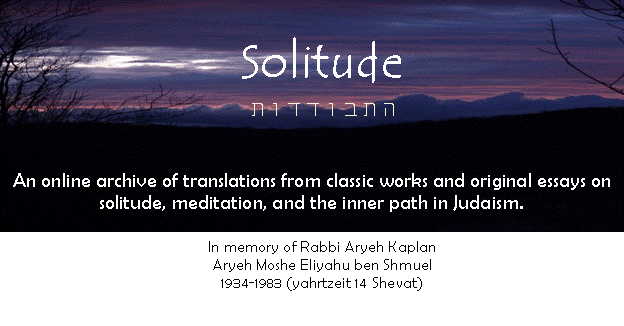From Rabbi Yosef Yitzchak Schneersohn of Lubavitch, Likkutei Dibburim (“An Anthology of Talks”) (Kehot) Vol. I, sec. 26-30 translated by Rabbi Uri Kaploun. (Footnotes have either been incorporated into the text or omitted. We took the liberty of creating our own subtitles for this online version.)
Solitude vs. RevelationThe Baal Shem Tov, as we have seen, did not want to reveal himself. In this we may discern two trends -- a reluctance to bid farewell to the isolated world of hisbodedus, and a reluctance to join in the world of revelation. For a long time he wrestled with R. Adam Baal Shem and evaded acceding to his demand, until his Rebbe, Achiyah HaShiloni, assured him that only by revealing himself would he secure the wondrous advantage of solitude; in other words, that through his revelation the virtue of hisbodedus and the virtue of hisgalus would unite.
From the verse "And Moshe used to pasture…" (Exodus 3:1-15), we see that Moshe Rabbeinu chose to be a shepherd in order to be able to live a life of solitude. As we have seen, the great advantage of solitude is that it serves as a "handle" to contemplation, and in fact, it was when he was in that state that the divine light was revealed to him.
When he beheld this light, he said to himself: "I shall turn aside and see this great sight" (Exodus 3:3), and Rashi comments, "I shall turn aside from here to come nearer there."
On this aspiration -- to “turn aside from here to come nearer there” -- hangs the whole of humanity; in this aspiration lies the whole of avodah, and most particularly the avodah of the misboded, of him who serves in solitude. For with this aspiration he climbs ever higher, never satisfied with his present rung. This aspiration of his pours forth in two directions -- in an urge to "turn aside from here" and in an urge to "come nearer there."
It is an all-encompassing aspiration -- not the inner content of some particular situation, but the inner content of a universal situation: it expresses the highest level of humanity in general, and of avodah in particular. It signifies a yearning, opening up new sources that lend strength to one's faculties and senses, so that one becomes an ever-flowing wellspring, a river that never ceases.
This aspiration exists both in relation to haskalah (deep intellectual perception) and to avodah. It is the peak of each, enabling one to perfect the haskalah of the avodah in which he is presently laboring.
In haskalah this aspiration finds expression in intellectual sharpness. Thus we observe that one who is gifted in this way handles concepts by constantly climbing and clambering through them with the greatest acuity. No sooner has a proposition presented itself in his mind than it is thrust aside by a more closely-argued proposition -- and in this manner such a person climbs higher and higher. All these propositions and concepts constitute the pure essence of haskalah. They are the flashes of ko’ach hamaskil, the superconscious origin of intellect that pours forth perceptive ideas. These arguments are expressions of the intellective soul, and through the exercise of intellectual sharpness one arrives at the perfection of haskalah.
